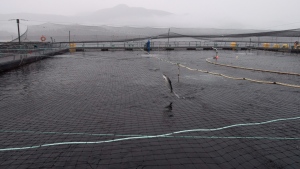A recent study conducted in British Columbia has revealed a concerning link between road salt and the health of salmon populations. The research, led by scientists at Simon Fraser University, suggests that the use of road salt during winter months may be contributing to the death and deformities of salmon in the province’s waterways.
The study, published in the journal Environmental Science and Technology, analyzed the effects of road salt runoff on salmon in the Lower Mainland region of British Columbia. Researchers found that the high levels of chloride in the water, a key component of road salt, were causing significant harm to the fish.
According to the study, the elevated chloride levels were causing osmoregulatory stress in the salmon, leading to dehydration and ultimately death. In addition, the exposure to chloride was also found to be causing deformities in the fish, such as curved spines and abnormal gill development.
The use of road salt is a common practice in many regions, including British Columbia, to prevent ice and snow buildup on roads during the winter. However, the study’s findings suggest that this practice may have unintended consequences for the environment and wildlife.
The researchers are calling for more sustainable alternatives to road salt, such as using sand or other de-icing agents, to be considered in order to protect the health of salmon populations. They also recommend implementing better management practices to reduce the amount of road salt runoff into waterways.
This study adds to the growing body of research highlighting the negative impacts of road salt on the environment. In addition to harming fish, road salt has been linked to damage to vegetation, soil, and freshwater ecosystems.
The findings of this study serve as a reminder of the importance of considering the potential consequences of our actions on the environment. As we continue to navigate the challenges of winter weather, it is crucial that we also prioritize the health and well-being of our natural surroundings.




